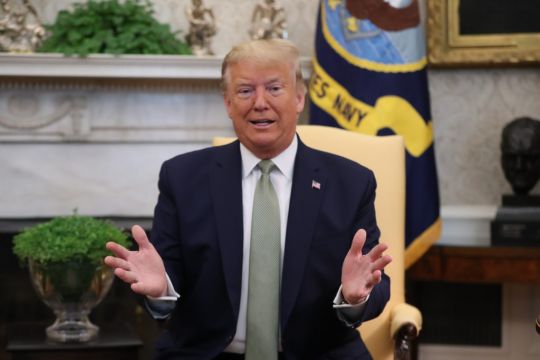While events in Washington DC on Wednesday night shocked the US and the rest of the world, they were the culmination of years of growing distrust of public figures, fuelled in large part by disinformation and social media.
While the rioting in Congress related to President Donald Trump’s claims — without evidence — that the election was stolen from him, this is not the first falsehood that has led to significant consequences in real life.
Here is a look back at the relationship between Mr Trump and online conspiracy theories.
The ‘birther movement’
Before he even became the Republican nominee, Mr Trump was one of the most prominent drivers of a conspiracy theory claiming that incumbent President Barack Obama was not born in the United States.
The false claims by Mr Trump and others eventually led Mr Obama to produce a copy of his birth certificate, which proved that he was born in Honolulu, Hawaii, and was therefore eligible to be president.
Pizzagate
One of the more bizarre conspiracy theories spread by right-wing internet users centred around claims of a fictitious child sex abuse ring based at a Washington DC pizzeria, which was falsely linked to high ranking Democrats including Mr Trump’s then presidential rival Hillary Clinton.
The unfounded claims remained in circulation on Twitter, Facebook, and other online discussion boards such as 4chan and 8chan in various forms all the way through to the 2020 election.
In 2016, one proponent of the theory fired a rifle inside the restaurant, while the owners have also reported receiving death threats as a result of it.
QAnon
Closely related to the “pizzagate” theory was QAnon – a debunked right-wing conspiracy that claimed, among other things, Mr Trump was fighting a secret battle against “deep-state enemies” and a cabal of child sex traffickers.
The name originally referred to an anonymous character named Q, who posted a series of messages on the 4chan and claimed, falsely, to have access to state secrets.
The theory began early in Mr Trump’s office and has since widened to become a calling card for many of his supporters, who are regularly seen branding QAnon slogans during his rallies.
It also looks set to last beyond his presidency.
In November’s election, Georgia Republican Marjorie Taylor, a vocal proponent of QAnon, was elected to the House of Representatives, having received the backing of Mr Trump.
‘Stop the steal’
While Mr Trump refrained from explicitly backing many of the conspiracy theories mentioned above, his failure to deny them was viewed as implicit support.
However, the falsehood that ultimately led to the invasion of the Capitol building came from the president himself after his election defeat to Joe Biden.
Many of those storming the historic building repeated the president’s unfounded claims that the election had been “stolen” from him, and that opponents were colluding to block him from a second term.
Even after the riots were under way, Mr Trump repeated the claims in a video posted to his accounts on Facebook, Twitter and YouTube.
All were censored in one form or another by the platforms.







